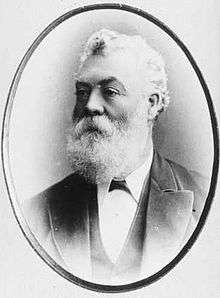John Darling Jr.
| John Darling Jr. | |
|---|---|
 | |
| 11th Leader of the Opposition (SA) | |
|
In office 1902–1904 | |
| Preceded by | Robert Homburg |
| Succeeded by | Thomas Price |
| Personal details | |
| Born | 24 January 1852 |
| Died | 27 March 1914 (aged 62) |
| Political party | Australasian National League (1896–05) |
John Darling, Jr. (24 January 1852 – 27 March 1914) was a South Australian businessman and politician. He was a member of the South Australian House of Assembly from 1896 to 1905, representing the electorates of East Torrens (1896-1902) and Torrens (1902-1905}. He was Leader of the Opposition from 1902 to 1904.[1] After leaving politics, he was chairman of the board of directors of Broken Hill Proprietary Co. Ltd. from 1907 to 1914.
Early life and business
Born in Edinburgh, Scotland, the son of John Darling Sr. on 24 January 1852. He emigrated to South Australia with his parents and brother, arriving in Adelaide early in 1855.[2] He was educated at the Pulteney Street School (later Pulteney Grammar School) and at the age of 14 started work in his father's business.[3]
In 1872 he was brought into partnership in his father's business, renamed John Darling and Son. His father retired in October 1897, leaving him in sole control. Under his control, the company purchased the Eclipse flour mills, Port Adelaide, and the goodwill of J. Dunn and Co. in ???. He founded a hay-compressing business in Gawler, near the railway station. He became a director of Broken Hill Proprietary Co. Ltd. in 1892 and was chairman of directors from 1907 to 1914.[4] He was on the local directorates of several insurance and mining companies with head offices in London, a director of the National Mutual Assurance Society, Victoria and the Port Adelaide Dock Company. He was an active member of the Chamber of Commerce, the Shipowners' Association, and the South Australian Employers' Union.[3]
Politics and social
Darling was part of the Australasian National League (previously National Defence League) and represented East Torrens in the South Australian House of Assembly the 1896 election to the 1902 election, and after a boundary redistribution, Torrens until the 1905 election.[1] He served as eleventh Leader of the Opposition. He was involved in the reconstruction of the Ministry following the retirement of the Hon. J. G. Jenkins, and when (later Sir) Richard Butler took office in 1905 prior to the election.
He was proud of his Scottish heritage; he was a member of the Caledonian Society of South Australia, and its Chief 1904–1907.
Family

He married Jessie Dowie (1852 – 23 November 1915), cousin of the evangelist John Alexander Dowie and aunt of the sculptor John Dowie (artist). They had six children: (3 boys and 3 girls) and lived at "Lynton", Kent Tce. Norwood.
- Harold Gordon Darling ( – 26 January 1950) became head of John Darling and Son and chairman of BHP. (see below)
- Leonard Darling lived in UK from 1911[5] and served in World War I. His son Leonard Gordon Darling (1921-31 August 2015,[6] born in London, England) served in World War II, reaching the rank of Captain, became a director of Broken Hill Proprietary in 1953 and chairman of John Darling Pty Ltd. in 1963.[7] He was a founding patron of the National Portrait Gallery.[8]
- Norman Darling became director of John Darling Pty Ltd in 1953.
- Florence Darling married F. W. Young, M.P. for Stanley, later Agent-General for South Australia.
- Gertie Darling
- Grace Darling
He died in a Melbourne private hospital on 27 March 1914. He had been in that city a few days to chair a meeting of Broken Hill Proprietary, when he took ill. His estate was valued at £1,694,500.[4]
References
- 1 2 "Mr John Darling Jr.". Parliament of South Australia. Retrieved 5 December 2013.
- ↑ Kent, H. S. K. "Darling, John (1831–1905)". Australian Dictionary of Biography. Canberra: Australian National University. Retrieved 5 December 2013.
- 1 2 "Obituary". The Examiner. Launceston, Tas.: National Library of Australia. 30 March 1914. p. 6 Edition: Daily. Retrieved 28 October 2014.
- 1 2 Kent, H. S. K. "Darling, John (1852–1914)". Australian Dictionary of Biography. Canberra: Australian National University. Retrieved 5 December 2013.
- ↑ "CONCERNING- PEOPLE.". The Register. Adelaide: National Library of Australia. 4 November 1912. p. 6. Retrieved 26 November 2011.
- ↑ Tribute to Leonard Gordon Darling from Artand, Melbourne
- ↑ Barnier, Cheryl Notable Australians Paul Hamlyn Pty, Australia 1978 ISBN 0-86832-012-9
- ↑ http://www.portrait.gov.au/UserFiles/file/Portrait35.pdf
| Political offices | ||
|---|---|---|
| Preceded by Robert Homburg |
Leader of the Opposition of South Australia 1902–1904 |
Succeeded by Thomas Price |
| South Australian House of Assembly | ||
| Preceded by David Packham |
Member for East Torrens 1896–1902 Served alongside: Frederick Coneybeer |
Succeeded by Electorate abolished |
| Preceded by New electorate |
Member for Torrens 1902–1905 Served alongside: Jenkins, Soward, Price, Coneybeer |
Succeeded by Crawford Vaughan George Dankel Thomas Hyland Smeaton Thomas Ryan |